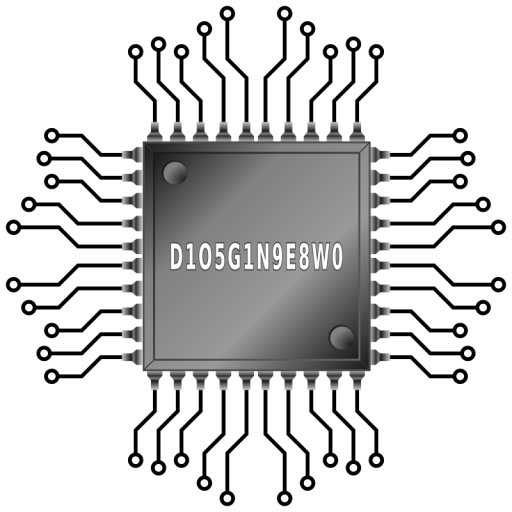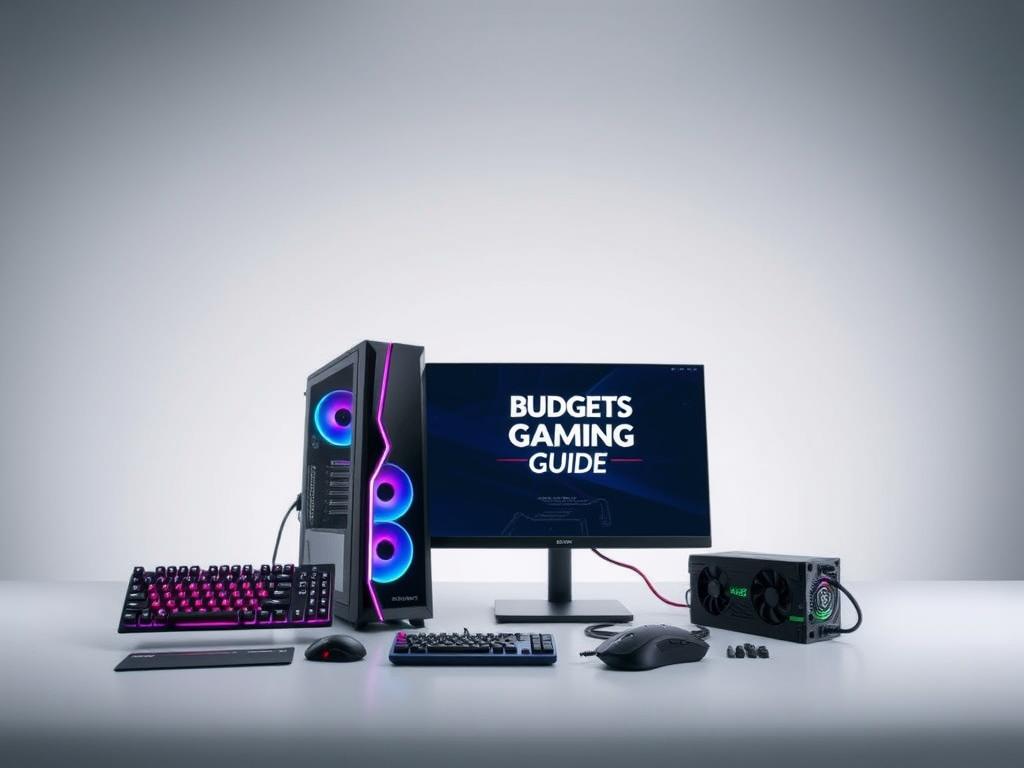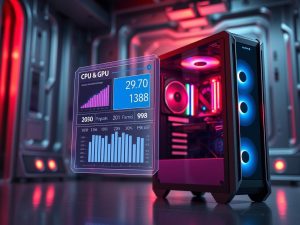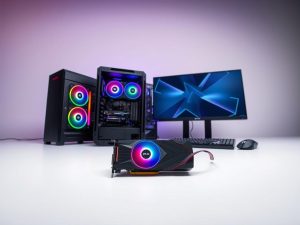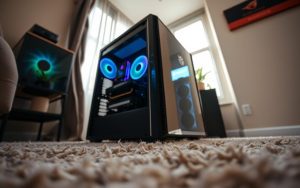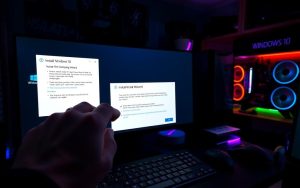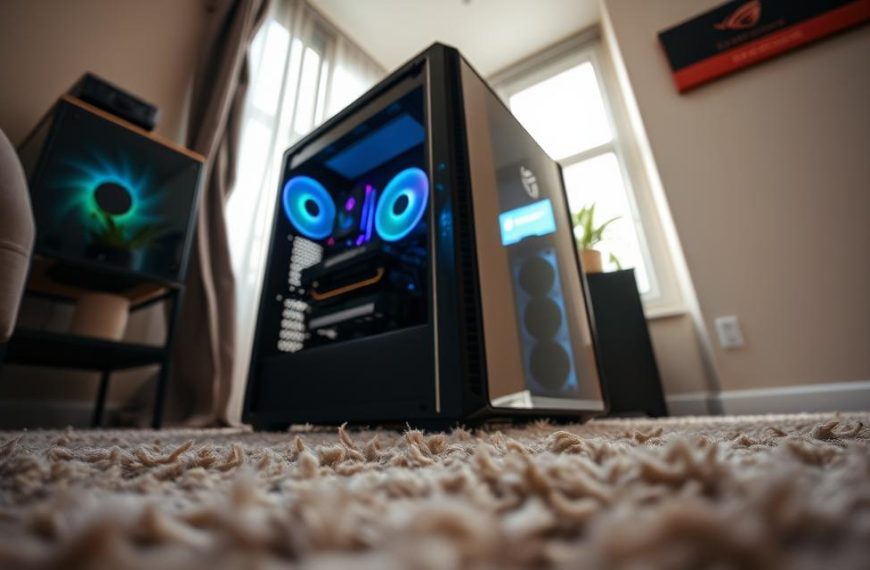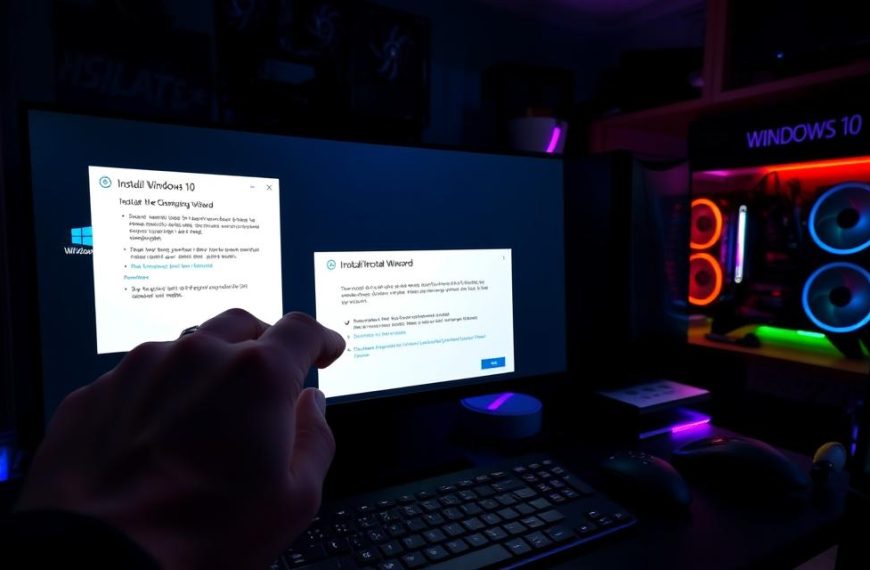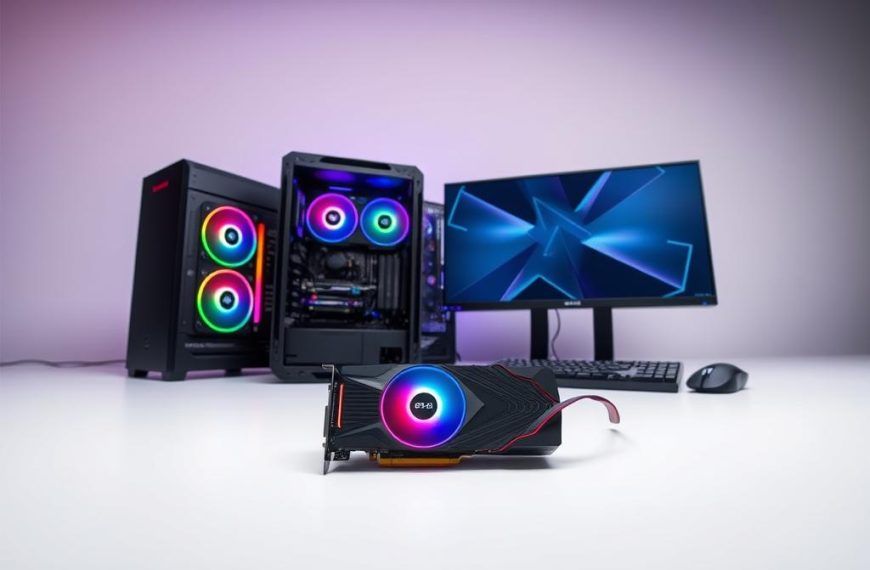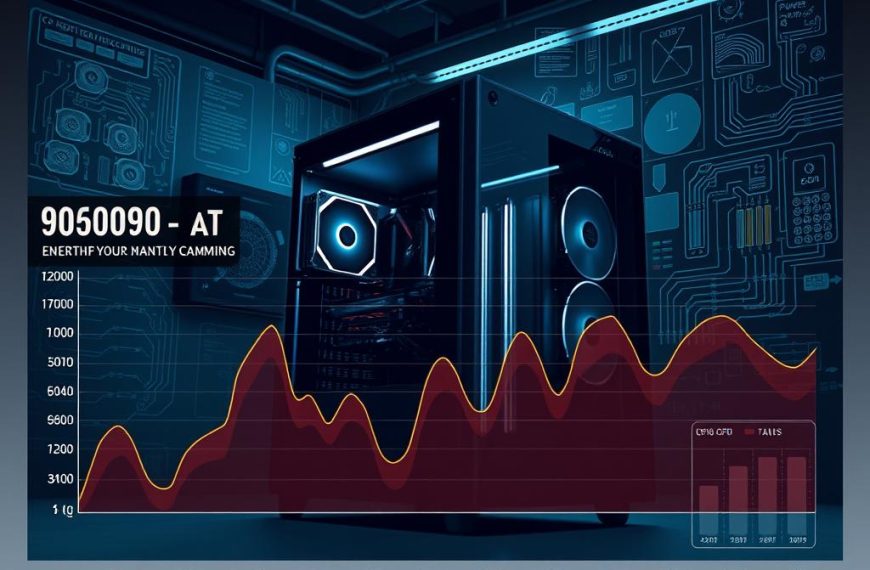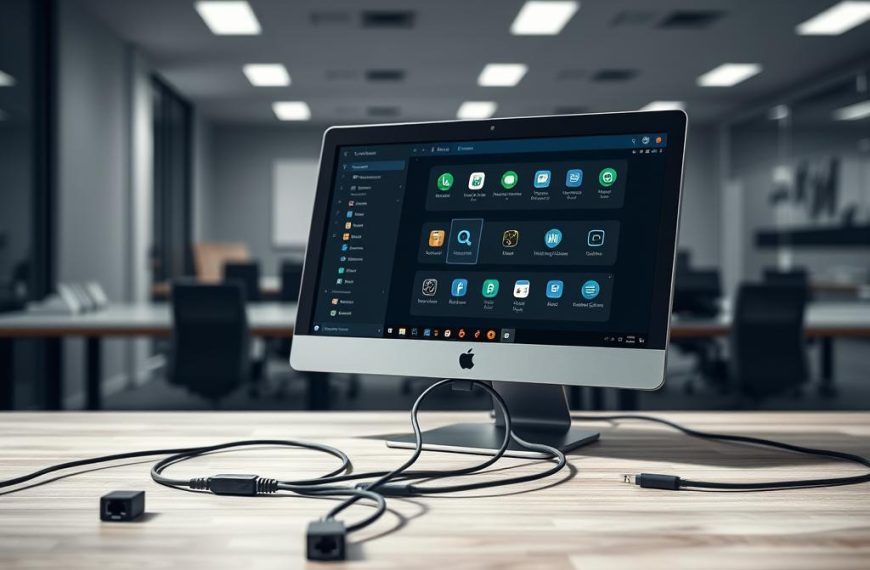Building a budget gaming PC can be thrilling. It enhances your gaming experience without emptying your wallet. Many think it’s too complex, but it’s more doable than ever.
My first PC build was nerve-wracking but educational. Smart planning and component selection are crucial. Anyone can create an impressive budget gaming rig with the right approach.
Modern budget PCs offer great gaming for under £870. High-quality gaming doesn’t require a fortune. The Intel Core i5-13400F and MSI Ventus 2X Nvidia GeForce RTX 3050 are excellent options.
This guide will simplify the building process. You’ll learn to create a powerful, affordable gaming machine. It’s perfect for first-time builders and those looking to upgrade.
We’ll explore how to balance performance and cost. You’ll discover ways to maximise gaming potential without overspending. Let’s dive into the world of budget gaming PCs.
Understanding Budget PC Building Fundamentals
Building a budget gaming PC requires smart choices to maximise performance. It’s about balancing cost and capability, turning limitations into opportunities. Clever decisions can create a powerful system without emptying your wallet.
Several key factors affect budget hardware selection. Your main aim is to build a system that excels in gaming without costing a fortune. Smart choices can lead to impressive results.
Key Components Overview
Essential PC components for a budget gaming build typically include:
- Processor (CPU): The brain of your system
- Graphics Card (GPU): Crucial for gaming performance
- Motherboard: Connects all components
- RAM: Minimum 16GB recommended
- Storage: Combination of SSD and HDD
Cost-Benefit Analysis
Budget gaming PC builders must spend wisely. Allocate approximately 30-40% of your budget to the graphics card and processor. These components greatly impact overall gaming performance.
“A smart budget build focuses on performance per pound, not just total cost.”
Performance Expectations
Realistic expectations are crucial for budget builds. A well-constructed budget gaming PC can typically achieve:
- 1080p gaming at 60-144 Hz
- Medium to high graphic settings
- Smooth gameplay in most modern titles
Careful component selection can create a capable gaming machine. Understanding trade-offs helps you build a PC that meets your needs without overspending.
Essential Tools and Workspace Preparation
Building a budget gaming PC requires a safe, static-free environment. A clean, organised workspace protects delicate computer components during assembly. Professional PC builders recommend this setup to minimise potential damage.
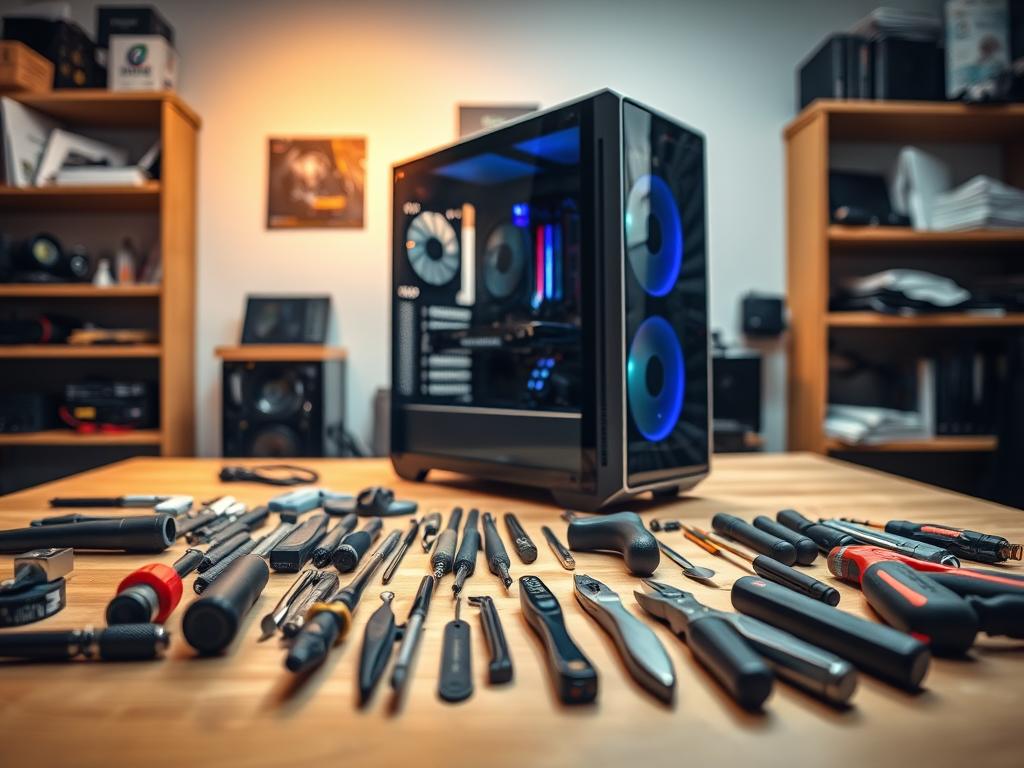
Static prevention is crucial when assembling computer parts. You’ll need specific tools for a smooth building process.
- Anti-static wristband
- Phillips head screwdriver
- Thermal paste applicator
- Cable ties
- Compressed air duster
Choose a large, hard surface like a wooden table for your workspace. Avoid carpeted areas or surfaces that generate static electricity. Wooden or plastic surfaces are best for preventing electrical discharge.
Remember: Your workspace is as important as the components you’re assembling!
| Tool Category | Recommended Items | Purpose |
|---|---|---|
| Safety Tools | Anti-static wristband | Prevent static electricity damage |
| Assembly Tools | Precision screwdriver set | Secure components safely |
| Cleaning Tools | Compressed air | Remove dust before assembly |
Proper workspace preparation ensures a smoother, safer PC building experience. With the right tools and environment, you’re ready to create your dream gaming PC.
How to Make a Good Budget Gaming PC
Building a budget gaming PC needs clever planning and smart part choices. By understanding component compatibility and value, gamers can create a powerful, affordable, and upgradeable PC.
This approach helps meet gaming needs without breaking the bank. It also allows for future improvements as technology advances.
Selecting Compatible Parts
Choosing the right components is vital for a great budget gaming setup. When picking parts, keep these key factors in mind:
- Ensure motherboard and CPU socket compatibility
- Check power supply wattage requirements
- Verify RAM and graphics card specifications
Price-Performance Ratio
| Component | Budget Range | Recommended Specs |
|---|---|---|
| Processor | £60-£90 | Intel Core i5-12600K or AMD Ryzen 5 5600X |
| Graphics Card | £130-£170 | Nvidia GeForce RTX 3050 or AMD RX 6500 |
| RAM | £55-£100 | 16GB DDR4 |
Future Upgrade Considerations
Think about long-term upgradability when building your budget gaming PC. Choose a motherboard with extra expansion slots for future additions.
Select a power supply that can handle future component upgrades. Investing wisely now can save money on complete system replacements later.
Tip: Always leave room in your budget for potential future enhancements to maintain your PC’s gaming performance.
Motherboard and CPU Selection Strategy
Choosing the right motherboard and CPU is crucial for a budget gaming PC. It’s all about finding the sweet spot between performance and cost. Budget-conscious gamers should prioritise compatibility and essential features over flashy marketing claims.
Affordable CPUs can deliver impressive gaming performance. Intel’s Core series, especially the Core i3, offers excellent value for money. These processors boast quad-core configurations and high boost clock speeds.
- Quad-core configuration
- High boost clock speeds
- Excellent price-to-performance ratio
When picking budget motherboards, focus on these key specs:
- Socket compatibility with your chosen CPU
- Expansion slot options
- Memory support capabilities
The secret to a great budget build is smart component selection, not just chasing the highest numbers.
Motherboard sizes can greatly impact your build. Mini-ITX to EATX form factors each have unique advantages. Mid-tower cases usually fit standard ATX motherboards, offering a good balance of size and expandability.
Building a budget gaming PC requires informed choices. By carefully selecting affordable CPUs and motherboards, you can create a powerful gaming rig. This approach ensures top performance without emptying your wallet.
Memory and Storage Solutions
Smart choices in memory and storage are crucial for budget gaming PCs. The right setup can boost performance without overspending. Understanding budget RAM and affordable storage options helps gamers get the most for their money.
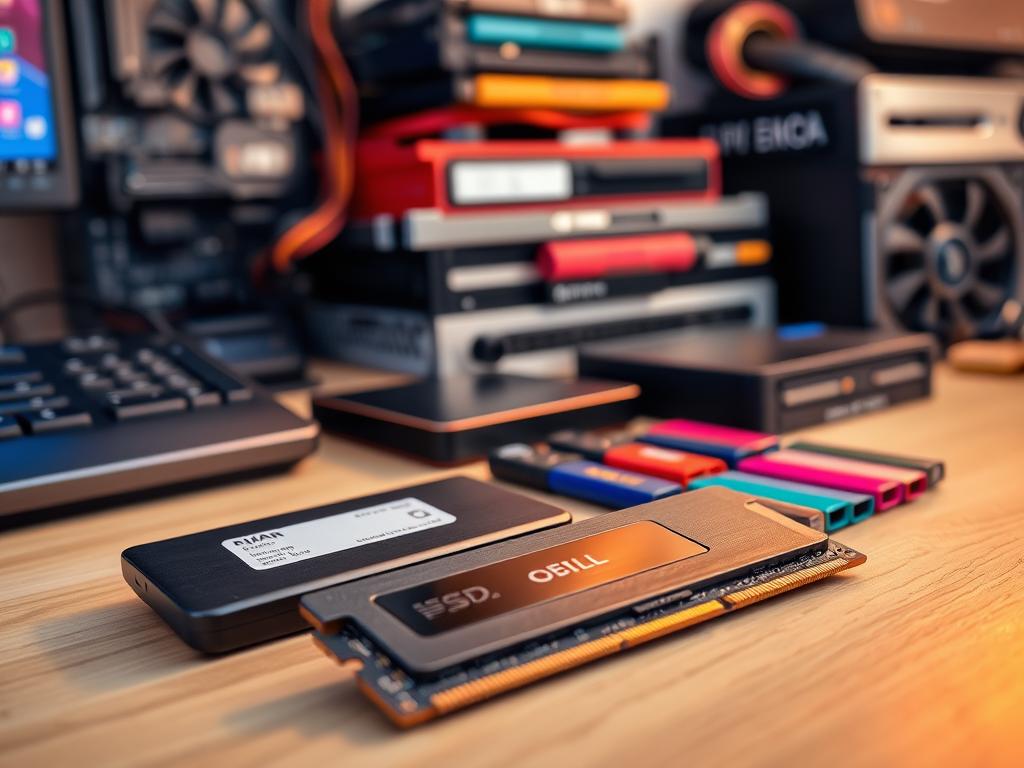
Balancing performance and cost is key when choosing memory and storage. Modern gamers need quick-loading systems that handle multiple tasks smoothly. Responsive setups are essential for an enjoyable gaming experience.
RAM Configuration Options
When considering budget RAM, focus on these key aspects:
- Minimum 16 GB recommended for gaming performance
- Consider 2 x 8 GB kit for optimal dual-channel performance
- Budget RAM options typically range from £40-£60
SSD vs HDD Considerations
Storage performance can greatly impact your gaming experience. Modern SSDs offer remarkable SSD performance advantages:
- Up to 90% more energy efficient than traditional HDDs
- Significantly faster load times for games and applications
- Affordable storage options now available under £50
Pro tip: Invest in a 512 GB SSD as your primary drive for optimal performance and game storage.
Storage Capacity Planning
Strategic storage planning ensures ample space for your gaming library. Consider these options for your setup:
- Primary SSD (256-512 GB) for operating system and frequently played games
- Secondary HDD (1-2 TB) for additional game storage and media files
- Consider total storage needs based on game library size
Careful selection allows budget-conscious gamers to build high-performance systems. With smart choices, you can create an exceptional gaming setup without breaking the bank.
Graphics Card Selection for Budget Gaming
Budget GPUs offer impressive gaming performance without breaking the bank. The AMD Radeon RX 7600 and Nvidia GeForce RTX 4060 stand out as top affordable choices. These cards provide excellent value for 1080p gaming at $264.99 and $304.97, respectively.
The Intel Arc A580, priced at $169.99, is a compelling alternative for cost-conscious gamers. Most budget cards focus on 1080p gaming with 6GB to 8GB of GDDR6 memory. Balancing performance and price ensures maximum gaming capabilities without overspending.
Consider factors beyond raw performance when choosing a graphics card. Power efficiency, future driver support, and upgrade potential are crucial. The RTX 4060 offers 20% better performance than its predecessor with a modest 115-watt power draw.
Your ideal budget GPU depends on your gaming needs and system constraints. Options range from the MSI GeForce RTX 3050 at $179 to more robust cards around $300. There’s a perfect graphics card waiting to boost your gaming experience affordably.
